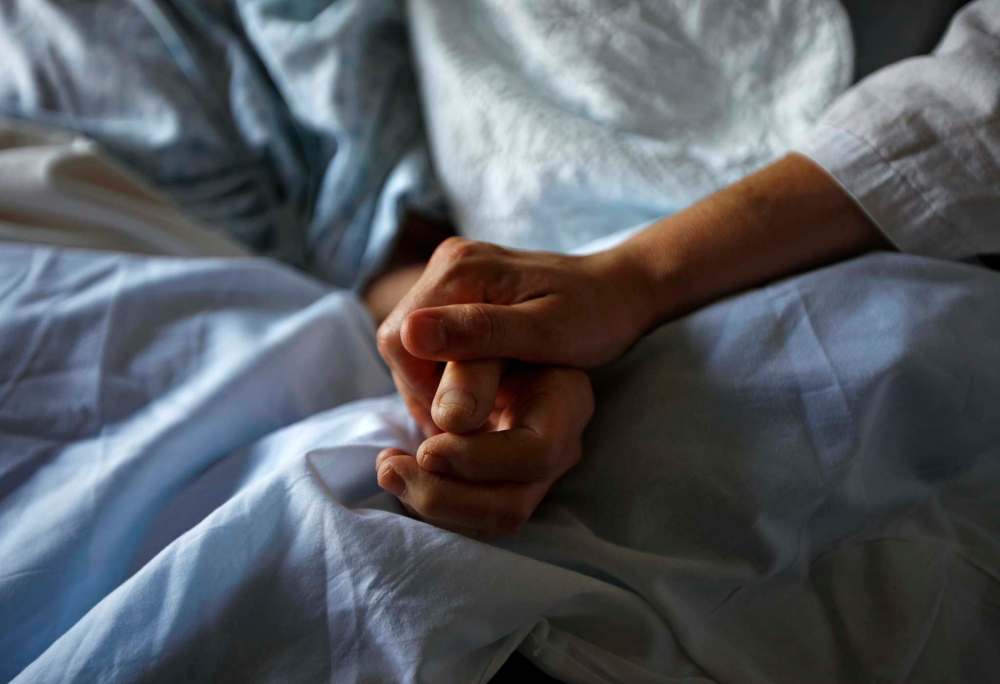St. B must offer assisted dying: poll
Patients should have option, no matter hospital's religious affiliation, survey says
Advertisement
Read this article for free:
or
Already have an account? Log in here »
To continue reading, please subscribe:
Monthly Digital Subscription
$1 per week for 24 weeks*
- Enjoy unlimited reading on winnipegfreepress.com
- Read the E-Edition, our digital replica newspaper
- Access News Break, our award-winning app
- Play interactive puzzles
*Billed as $4.00 plus GST every four weeks. After 24 weeks, price increases to the regular rate of $19.95 plus GST every four weeks. Offer available to new and qualified returning subscribers only. Cancel any time.
Monthly Digital Subscription
$4.99/week*
- Enjoy unlimited reading on winnipegfreepress.com
- Read the E-Edition, our digital replica newspaper
- Access News Break, our award-winning app
- Play interactive puzzles
*Billed as $19.95 plus GST every four weeks. Cancel any time.
To continue reading, please subscribe:
Add Free Press access to your Brandon Sun subscription for only an additional
$1 for the first 4 weeks*
*Your next subscription payment will increase by $1.00 and you will be charged $16.99 plus GST for four weeks. After four weeks, your payment will increase to $23.99 plus GST every four weeks.
Read unlimited articles for free today:
or
Already have an account? Log in here »
Hey there, time traveller!
This article was published 04/09/2017 (3063 days ago), so information in it may no longer be current.
Advocates say a provincial government policy about medical assistance in dying could impede Manitobans’ right to access the procedure.
The internal policy, approved by Manitoba Health in January this year and recently received through a freedom of information request, outlines the policies and protocols regional health authorities must ensure are in place by Nov. 26. That includes protocols for the transfer of patients out of faith-based facilities that want to abstain from all aspects of medical assistance in dying.
St. Boniface Hospital came under fire earlier this summer when the Free Press revealed it had stacked the hospital board in order to overturn a vote that would have allowed assisted dying on site under rare circumstances. Multiple board members resigned in the aftermath, although Health Minister Kelvin Goertzen said in June that the stacking of the board was in keeping with the “rules” of the Catholic Health Corp. of Manitoba, which has complete operational control of the publicly funded hospital.

But the majority of adults in Winnipeg don’t agree that publicly funded hospitals, even those that are faith based, should be allowed to deny access, according to a new survey from Probe Research.
Indeed, even though the original hospital board only voted to allow assisted dying under rare circumstances, the survey found that 59 per cent insist the hospital must offer it when patients ask.
That majority should be concerned about the provincial policy on medical assistance in dying (MAID), said Cory Ruf of Dying with Dignity Canada.
“Some of the language and the contradictions in here really gave me pause,” Ruf said. “They say they’re directing the health authorities and objecting facilities to develop policies to ensure that patients aren’t delayed or blocked from MAID but then a line later admit that the ban on MAID at certain facilities makes that literally impossible in some cases. The circle just cannot be squared here.”
Ruf is referring to sections 5.10 and 5.15 of the policy. The former notes that health authorities must ensure that staff who do not want to participate are “not forced, coerced, or face retaliatory action as a result” while at the same time “ensuring that patients still have access to all aspects and processes associated with MAID without delay.”
The latter, requires abstaining facilities like St. Boniface Hospital to put in writing that people at their facility may not be allowed to access medical assistance in dying if they are “too ill or too frail to be transferred.”
“I think the Pallister government is tying itself in knots here,” Ruf said. “They’re saying OK we need to develop policies to ensure that these conscientious objections don’t result in patients being denied their right to MAID and then a few line items later admitting that in some cases that’s going to be impossible and we’re talking about a constitutionally protected right here.”
Survey highlights
Question: “Recently, there’s been some debate about whether St. Boniface Hospital should offer medically assisted dying to patients who request it. Some people say a Catholic hospital has the right to refuse to offer medically assisted dying on religious grounds. Other people say a publicly funded hospital must provide all legal medical services to patients who request it, regardless of whether it is a faith-based hospital or not. Which one best reflects your own views?”
59 per cent are quite adament that St. Boniface Hospital needs to offer medically-assisted dying to those who want it, no matter the hospital’s religious affiliation.
25 per cent believe St. Boniface Hospital should be allowed to refuse to offer assistance in dying because of its religious affiliation.
Question: “If you had a serious illness or accident, how likely would you be to avoid seeking treatment at St. Boniface Hospital, knowing the hospital does not allow medically assisted dying?”
66 per cent say they wouldn’t avoid treatment at St. Boniface, but will go where the medical professionals tell them to
17 per cent say they will actively avoid treatment at St. Boniface because of its refusal to provide medical assistance in dying.
10 per cent said they would try to be treated at the St. Boniface Hospital.
Survey methodology:
Probe Research surveyed more than 600 Winnipeg adults using an online survey between Aug. 8 and Aug. 20. Due to the online nature of the survey, there is no margin-of-error.
Probe used minor statistical weighting to ensure that the respondents reflect the known demographics of Manitoba’s adult population.
Mark Handelman, a Toronto-based lawyer specializing in health law, said it’s not a case of trampled rights. Although, he did note that “that is easy for me to say when I’m not a patient whose constitutional right to a treatment is not available only because I cannot find a health practitioner who agrees to propose it for me.”
While the Supreme Court has been clear that individuals do not need to help someone die, it has not specified whether a facility itself can (although many, including St. Boniface, have been allowed to across the country).
“Everyone is trying to figure out how to balance the rights of patients at end of life whose suffering is intolerable to them against the rights of health practitioners and facilities exercising their right to conscientiously object,” he said. “It is a tricky conflict… and will probably eventually end up before the courts.”
It’s an issue Manitoba health care facilities — including personal care homes — are grappling with right now. All have been given until the end of November to come in line with the provincial policy.
But even that process raises some questions of accountability.
Manitoba Health says it will not be reviewing the policies, only auditing them every now and then, and will instead leave the review process to each health authority. However, the executive director of Southern Health-Santé Sud said it wouldn’t be reviewing the policies of its six faith-based personal care homes because they are “affiliates.”
In Interlake-Eastern, its unclear which personal care homes are faith-based and what their right to refuse medical assistance in dying on premises is given a spokeswoman said none of their agreements spell out their faith status.
That’s important to note given the province has multiple faith-based agreements that protect hospitals and certain other health care facilities’ right to provide care in line with their religious beliefs. When the Free Press reached out to Manitoba Health to confirm whether such province-wide protection existed for personal care homes, a spokeswoman said it would require another freedom of information request.
“These things are all related,” Ruf said.
Clarification is needed, he said, not just on the internal policy but also on how that policy will be affected by Bill 34 if it passes.
The bill, introduced in May by Goertzen, would make participating in medically assisted deaths not mandatory — a protection already spelled out by the Supreme Court and by Goertzen’s own department in its January 2017 policy.
“If Bill 34 is passed,” Ruf said, “its not precisely clear whether that would require reporting or making a referral, whether that would even be enforceable.”
Goertzen was unavailable to speak on Friday, although a spokeswoman highlighted section 5.3 in the policy which “clearly states that access to timely and accurate information regarding MAID will be available in all facilities, irrespective of whether or not they are an abstaining facility.”
Ultimately, Ruf said, he’s heartened at least to see the provincial policy include a requirement that every facility and every region’s policies, once completed, must be posted online and “readily available to the public.”
It’s a public that seems to be more embracing of assisted dying, if the Probe Research survey is any indication.
“The fact that most people think St. Boniface should offer it suggests to me that the idea of doctor assisted (dying) has a degree of acceptance,” Probe Research associate Mary Agnes Welch said.
“That maybe even surprises me,” she continued. “We’re not only saying we’re comfortable with this happening somewhere, we’re saying really this should be available at all kinds of hospitals.”
jane.gerster@freepress.mb.ca



